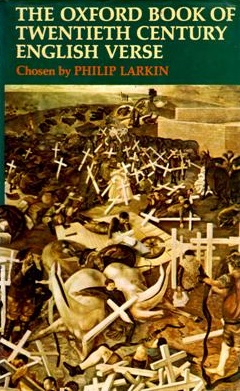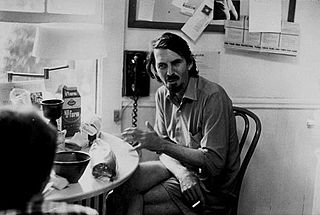London
When Hobsbaum moved to London, the discussion group reconstituted itself there. It is this London group that is now referred to as The Group.
The London meetings started in 1955 once a week, on Friday evenings, at first at Hobsbaum's flat and later at the house of Edward Lucie-Smith. The poets gathered to discuss each other's work, putting into practice the sort of analysis and objective comment in keeping with the principles of Hobsbaum's Cambridge tutor F. R. Leavis and of the New Criticism in general. Before each meeting about six or seven poems by one poet would be typed, duplicated and distributed to the dozen or so participants.
There was no manifesto as such. Lucie-Smith wrote, in a letter to Hobsbaum dated November 1961: 'This is a group of poets who find it possible to meet and discuss each other's work helpfully and without backbiting or backscratching…we have no axe to grind — this isn't a gang and there's no monolithic body of doctrine to which everyone must subscribe'.
The poets who met included George MacBeth, Edward Lucie-Smith, Philip Hobsbaum, Peter Redgrove, Alan Brownjohn, Peter Porter and Martin Bell. Ted Hughes occasionally attended.
Lucie-Smith
The chairmanship of the group passed to Edward Lucie-Smith in 1959 when Hobsbaum left London to study in Sheffield. The meetings continued at his house in Chelsea, and the circle of poets expanded to include Fleur Adcock, Taner Baybars, Edwin Brock, and Zulfikar Ghose; others including Nathaniel Tarn circulated poems for comment. [1]
Lucie-Smith and Hobsbaum edited A Group Anthology (London: Oxford University Press, 1963); in the foreword the aim is described of writing 'frank autobiographical poems' and a 'poetry of direct experience'. In the anthology's epilogue Hobsbaum writes of the importance of discussion, and the writer's need for 'community to keep him in touch with his audience.'
Satire was prominent in the works of Bell, Brownjohn, and Porter.
The Movement was a term coined in 1954 by J. D. Scott, literary editor of The Spectator, to describe a group of writers including Philip Larkin, Kingsley Amis, Donald Davie, D. J. Enright, John Wain, Elizabeth Jennings, Thom Gunn and Robert Conquest. The Movement was quintessentially English in character; poets from other parts of the United Kingdom were not involved.

The Oxford Book of Twentieth Century English Verse is a poetry anthology edited by Philip Larkin. It was published in 1973 by Oxford University Press with ISBN 0-19-812137-7. Larkin writes in the short preface that the selection is wide rather than deep; and also notes that for the post-1914 period it is more a collection of poems, than of poets. The remit was limited by him to poets with a period of residence in the British Isles. Larkin's generous selection of Thomas Hardy's poems has been noted for its influence on Hardy's later reputation. On the other hand, he was criticized, notably by Donald Davie, for his inclusion of "pop" poets such as Brian Patten. The volume contains works by 207 poets.
Penguin Modern Poets was a series of 27 poetry books published by Penguin Books in the 1960s and 1970s, each containing work by three contemporary poets. The series was begun in 1962 and published an average of two volumes per year throughout the 1960s. Each volume was stated to be "an attempt to introduce contemporary poetry to the general reader". The series added up to a substantial survey of English-language poetry of the time.
British Poetry since 1945 is a poetry anthology edited by Edward Lucie-Smith, first published in 1970 by Penguin Books. The anthology is a careful attempt to take account of the whole span of post-war British poetry including poets from The Group, a London-centred workshop for whom Lucie-Smith himself had once been chairman.
John Francis Alexander Heath-Stubbs was an English poet and translator. He is known for verse influenced by classical myths, and for a long Arthurian poem, "Artorius" (1972).
Alan Charles Brownjohn is an English poet and novelist. He has also worked as a teacher, lecturer, critic and broadcaster.
Philip Dennis Hobsbaum was a British teacher, poet and critic.
Jon Silkin was a British poet.

Peter William Redgrove was a British poet, who also wrote prose, novels and plays with his second wife Penelope Shuttle.

Peter Neville Frederick Porter OAM was a British-based Australian poet.

John Edward McKenzie Lucie-Smith, known as Edward Lucie-Smith, is a Jamaican-born English writer, poet, art critic, curator and broadcaster. He has been highly prolific in these fields, writing or editing over a hundred books, his subjects gradually shifting around the late 1960s from mostly literature to mostly art.
The Belfast Group was a poets' workshop which was organized by Philip Hobsbaum when he moved to Belfast in October 1963 to lecture in English at Queen's University.
Vincent Martin Oliver Bell was an English poet who was a key member of The Group, an informal group of poets who met in London from the mid-1950s to the mid-1960s.
Nationality words link to articles with information on the nation's poetry or literature.
Nationality words link to articles with information on the nation's poetry or literature.
Nationality words link to articles with information on the nation's poetry or literature.

Nationality words link to articles with information on the nation's poetry or literature.
Barry Tebb is an English poet, publisher and author. He was born in Leeds, West Riding of Yorkshire in 1942.
delta was a small poetry magazine that was produced at the University of Cambridge in the 1950s and 1960s. The magazine was first published in 1954. The founder was Peter Redgrove. It was originally edited by Peter Redgrove and Rodney Banister, but Redgrove persuaded Philip Hobsbaum to take over from Issue 3. The magazine introduced various poets, including The Group figures Edward Lucie-Smith and Peter Porter. From 1972 the magazine was not edited from Cambridge. It ended publication in 1981.

That part of the United Kingdom called Northern Ireland was created in 1922, with the partition of the island of Ireland. The majority of the population of Northern Ireland wanted to remain within the United Kingdom. Most of these were the Protestant descendants of settlers from Great Britain.
This page is based on this
Wikipedia article Text is available under the
CC BY-SA 4.0 license; additional terms may apply.
Images, videos and audio are available under their respective licenses.





